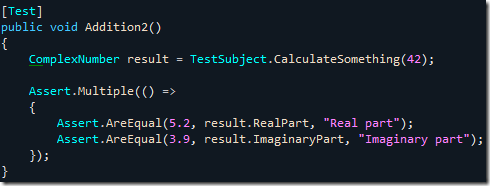I prefer to be practical and put several related assertions in one method.
I have a helper class which enables the following syntax (I use):
AssertAll.Succeed(
() => Assert.AreEqual("bb", id.Context),
() => Assert.AreEqual("abc", id.FullName),
() => Assert.AreEqual("b", id.SessionID));
which gives me error messages like this:
Assert.AreEqual failed. Expected:<bb>. Actual:<b\c>.
Assert.AreEqual failed. Expected:<abc>. Actual:<[b\c]a{103}>.
at FXP_COM.Tests.EnumToStringConverterterTests.<>c__DisplayClass3.<ShouldConvert>b__0() in UnitTest1.cs: line 31
at FXP_COM.Tests.AssertAll.Succeed(Action[] assertions) in UnitTest1.cs: line 46 at FXP_COM.Tests.AssertAll.Succeed(Action[] assertions) in UnitTest1.cs: line 62
at FXP_COM.Tests.EnumToStringConverterterTests.ShouldConvert() in UnitTest1.cs: line 30
and the helper class is the following:
using System;
using NUnit.Framework;
using System.Collections.Generic;
using System.Linq;
using System.Reflection;
public static class AssertAll
{
public static void Succeed(params Action[] assertions)
{
var errors = new List<Exception>();
foreach (var assertion in assertions)
try
{
assertion();
}
catch (Exception ex)
{
errors.Add(ex);
}
if (errors.Any())
{
var ex = new AssertionException(
string.Join(Environment.NewLine, errors.Select(e => e.Message)),
errors.First());
// Use stack trace from the first exception to ensure first
// failed Assert is one click away
ReplaceStackTrace(ex, errors.First().StackTrace);
throw ex;
}
}
static void ReplaceStackTrace(Exception exception, string stackTrace)
{
var remoteStackTraceString = typeof(Exception)
.GetField("_remoteStackTraceString",
BindingFlags.Instance | BindingFlags.NonPublic);
remoteStackTraceString.SetValue(exception, stackTrace);
}
}

